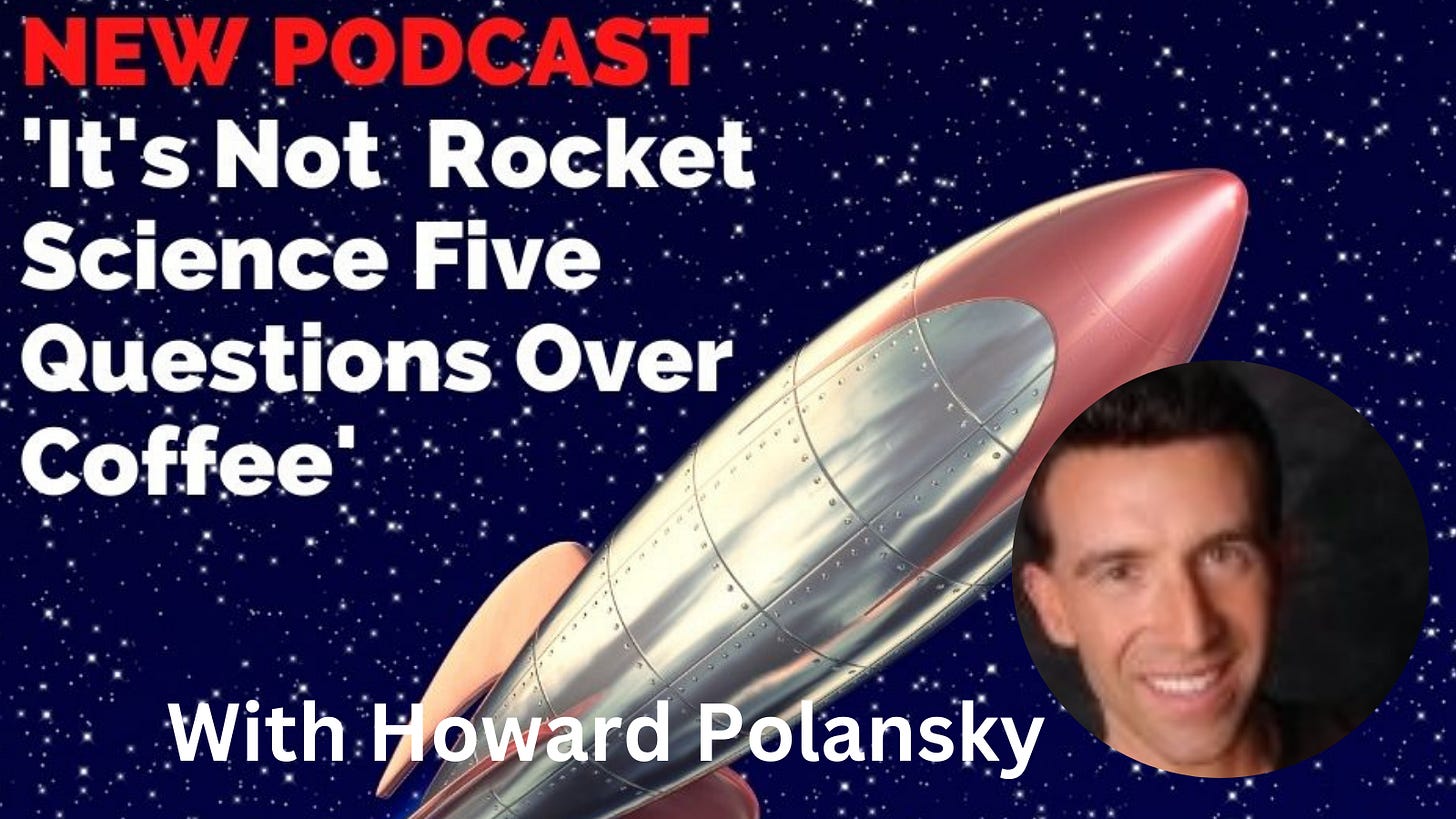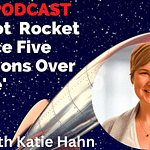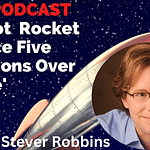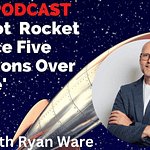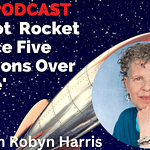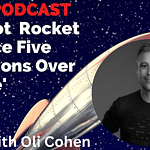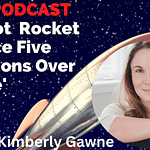Who is Howard?
Howard Polansky is a pragmatic individual who navigates life's financial intricacies with a focus on strategic decision-making. Recognizing common defaults in financial practices, he often critiques the conventional 30-year mortgage system prevalent in the United States. Polansky understands that while many opt to pay extra on their monthly mortgage to reduce the term, the fixed nature of the monthly payment remains unchanged, a topic he frequently discusses. His insights reflect a deep understanding of financial commitments, emphasizing the impact of additional payments and highlighting the etymology of "mortgage" as a lasting "death pledge." Through his observations, Polansky shares his wisdom on making informed financial choices.
Key Takeaways
00:00 "Cash Flow Chat with Howard"
06:03 Pay Yourself First, Always
08:01 "Ebook Insights on Home Equity"
12:40 "Prepare Financially During Success"
16:21 "Key Unasked Question"
19:32 "Motivating Business Financial Freedom"
_________________________________________________________________________________________________
Subscribe to our newsletter and get details of when we are doing these interviews live at https://systemise.me/newsletter
Find out more about being a guest at : link.thecompleteapproach.co.uk/beaguest
Subscribe to the podcast at https://link.thecompleteapproach.co.uk/podcast
Help us get this podcast in front of as many people as possible. Leave a nice five-star review at apple podcasts : https://link.thecompleteapproach.co.uk/apple-podcasts and on YouTube : https://link.thecompleteapproach.co.uk/Itsnotrocketscienceatyt!
Here's how you can bring your business to THE next level:
If you are a business owner currently turning over £/$10K - £/$50K per month and want to grow to £/$100K - £/$500k per month download my free resource on everything you need to grow your business on a single page :
It's a detailed breakdown of how you can grow your business to 7-figures in a smart and sustainable way
————————————————————————————————————————————-
Transcript
Note, this was transcribed using a transcription software and may not reflect the exact words used in the podcast)
SUMMARY KEYWORDS
Cash flow, cash flow coach, financially led, debt management, high debt professions, medical debt, student loan debt, mortgage payments, fixed debt payments, paying off debt, interest reduction, offset mortgage, home equity line of credit, business owners, business cash flow, paying yourself first, tax payments, IRS, emergency fund, financial planning, risk management, business continuity, business loans, personal finance education, burnout, work-life balance, entrepreneur finances, insurance planning, financial ebook, income preservation
SPEAKERS
Howard Polansky, Stuart Webb
Stuart Webb [00:00:33]:
Hi, and welcome back to It's Not Rocket Science, five questions over coffee. I haven't actually got a coffee in front of you at the moment. This is actually fruit tea, because if I drink too much coffee, after lunchtime, I start to go to sleep. And I don't wanna go to sleep right at the moment because I'm really interested in speaking with Howard Polanski. Howard is a he's a cash flow coach, who doesn't need to speak to one of those nowadays. Howard is the cash flow coach at Financially Led, and we're we're gonna get into what that means at the moment. But who doesn't wanna spend some time thinking about cash flow and how to preserve it in these days? So, Howard, welcome to It's Not Rocket Science, five questions over coffee, and I trust you're ready to take us through cash flow and financially led.
Howard Polansky [00:01:26]:
Thank you, Stuart. Thank you for the opportunity.
Stuart Webb [00:01:30]:
It's It's terrific. So let's start with, let's just start. You're you're you're a former dentist, so we'll get into how you ended up in this situation. But who is it you're trying to help with your advice on on cash flow and and financial matters overall?
Howard Polansky [00:01:47]:
Those that don't like being in debt. And if we're talking about people let me just use The US since that's where I'm based. Those professions that are high debt type of professions, medical doctors, dentists, chiropractors, optometrists, lawyers, where they just have these massive fixed payments that they're trying to navigate around. And sometimes it feels like all I'm doing is going to work to literally pay off these debts. When do I get to enjoy my life?
Stuart Webb [00:02:25]:
Yeah.
Howard Polansky [00:02:25]:
And and I'm not saying that there's not other industries that face that challenge, but those are the obvious ones that if there is a way for us to minimize the impact of those fixed debt payments, get them out of our lives sooner, pay less interest. Now all of a sudden, you have more money freed up at the end of each month.
Stuart Webb [00:02:47]:
And and and, Howard, I'm I'm sure you can you can sort of, you can help us to understand this, but was that a situation that you were in as a dentist? Did you find yourself wondering every day, why am I doing this? There must be an easier way to make a loss, and that's what you led you to where you are?
Howard Polansky [00:03:05]:
Well, I didn't know if that was gonna be the question now or it was gonna be question number five in terms of how I got into this. If you wanna wait until then, we can, or you want me to go through the story now, I will.
Stuart Webb [00:03:16]:
Yeah. I'll put it I'll put it to you as question five. Let's just talk a little bit more about how you, what you the the sort of things that the the people you've helped have got into the sort of trouble they have, and what are they trying to do to get out of it? What is it what is it you see when you sort of they they eventually engage an expert like you and you start dealing with them? So they they recognize eventually they they have a problem and they need to do something about it.
Howard Polansky [00:03:42]:
Yeah. So, I mean, one of the I hate to call it a mistake, but one of the ways that people are doing it just because it's either it's by default or by design. And so by default, they're like, I've got this mortgage. Let's just say that. And in The US it's a thirty, traditionally a thirty year mortgage. Well, I don't wanna pay on this for thirty years, so let me throw a little bit of additional money against this. So if I've got a $2,000 mortgage, let me put 2,200 and I know that's going to save me some time. The problem is, what's your payment the next month? It's still the $2,000 It does not change when you put extra money against the mortgage because the more mortgage is two French words put together, which literally means death pledge.
Howard Polansky [00:04:39]:
So the system is set up for you to make payments until the day you die or you're gonna die trying. This allows you and, again, you're we're over on different sides of the pond, so I'm not gonna keep this a secret. Over in The UK and Australia, they're known as offset mortgages. So the open ended mortgages where all of the money can go in to lower the overall balance of the debt. When you lower the overall balance of the debt, you're lowering the amount of interest you pay on a daily basis. And then when the expenses come due, you just take that much out, but you've got the excess now attacking the entirety of the debt versus the way that it's set up in The US. They have a one way street known as your house in front of you. You only make the minimum payment because you're like, if I put more money in, I can't get the money back out.
Howard Polansky [00:05:42]:
And when we don't have access to money, that's when people don't sleep very well. So that's the common mistake is how I'm just putting more money into this loan, but then if something happens, I get disabled, I get fired, I still have this fixed payment in front of me, and now I have no wiggle room.
Stuart Webb [00:06:03]:
Yeah. I I'm always very aware that a lot of business owners, disobey, for want of a better word, one of the golden rules which which I think is is something I hope you'll you'll agree with, which is they forget that they need to pay themselves first out of the income into their business. They're putting it against all sorts of other things, and then eventually they realize that there isn't anything left for them. And they they're left in a situation like you've just said where suddenly they are unable to pay the bills that have come in for their family, and they then have to get back on the treadmill and work even harder because they've now forgotten that they've got a life. And and I just think it's it's it's often this the the the the the golden rules of, you know, thinking about your cash flow and how you allocate it are so difficult for many business owners for for reasons because often we are not taught. We are not given the instruction early enough in our lives about how to manage money.
Howard Polansky [00:07:04]:
What's even worse than not paying yourself first is not only do you pay yourself, you take the money from the IRS that you have to pay them and use that on your expenses too. I've seen that situation happen also. That's never a good situation that I wanna be involved in.
Stuart Webb [00:07:23]:
Now if there's one thing you should definitely be very aware of is the tax man will find you and will hunt you down if you are if you are diligent in, not diligent in playing that that money off. Howard, look. The the the these must be times at the moment. People are are listening to you and thinking, I think I hear myself in this. This might be me. What valuable piece of advice or or or free free offer can you sort of help people with? And, and how would you sort of, you know, give them that that allow them to sort of access you?
Howard Polansky [00:08:01]:
Yeah. The probably the easiest way to understand a little bit more of the concept behind this is my ebook. So financiallyled.com, so that's just LEDfinanciallyled.com/ebook. It'll take you maybe about twenty minutes to go through and start to understand the three lessons on how and why this works. The second, if I'm okay if it's okay for me to get a second piece of advice, Stuart, is if you have lived in let's just keep it on the personal side for now. If you've lived in your residence for a number of years now, whether it's in overseas or in The US, it doesn't matter, Your house is probably appreciated substantially, and there is equity. There is cash literally trapped in the bricks. While you're employed, while business looks good, go get a home equity line of credit.
Howard Polansky [00:09:08]:
Have access to the cash because you just never know what's gonna happen in life. I mean, here's a perfect example. One of my clients is a dentist. She texts me back in November saying, guess what happened to me two months ago? I'm like, this is just out of the blue. I'm like, I don't know. COVID? It's like, no. Two ruptured aneurysms and a mini stroke. Mhmm.
Howard Polansky [00:09:34]:
Mhmm. She's 40 she's 46 years old, Stuart. I don't think this was in her life plan in terms of, oh, I'm gonna go I wanna be in the ICU and have brain surgery for three weeks sitting in a hospital. If it wasn't for having the business line of credit set up twelve to eighteen months ago, her business would be toast. That buffer of cash is what allowed her to keep paying the bills. Even though there was no money coming in, it was the access to cash that allowed her to pay her team, pay the bills so that she could get back to still having a a functioning business.
Stuart Webb [00:10:19]:
I've just put a link, on the the screen in front of you, Howard. I'm gonna put that story and the link to your ebook into our vault. Our vault, if you if it listen, guys, it if you're listening to this and you go, I need to do that. If you didn't capture what Howard just said, go to, Systemize, and that's the word systemize, but it's spelled with an s, not a zed, systemize slash free hyphen stuff. There's a vault there with with and and we'll put Howard's link, and we'll put that story in order for you to be able to sort of capture that and come back to it again and again and again because that is really valuable advice. I think that's a truth that everybody should be trying to do, Howard. It's not just dentists that have aneurysms. Anybody can have one of those.
Stuart Webb [00:11:03]:
You know, I I have a a a a friend who went on a very nice holiday, fell over, skiing, and they were in a similar situation. They were suddenly unable to work. And if they hadn't set up the right systems in place in in his case, it was the fact that his business carried on because he had set up teams that were working. But he had to you have to think ahead, don't you? You have to you do have to do exactly what you said. This might not be in the plan, but there is a risk that this could happen. So, therefore, I need to sort of deal with the risk before it happens, not as it happens because it takes time. These things take time to set up. They don't happen overnight.
Stuart Webb [00:11:46]:
You have to plan it. You have to think about it. You have to put that into your thinking, don't you?
Howard Polansky [00:11:51]:
Absolutely. And and look, you know as well as I do, when are banks gonna gonna be most, when are they gonna be most appreciative of giving you money? When you don't need it.
Stuart Webb [00:12:06]:
When you've got it.
Howard Polansky [00:12:08]:
That's exactly as soon as you're in distress, they're the last people that wanna help you. So get this set up while things are going good
Stuart Webb [00:12:18]:
Yeah.
Howard Polansky [00:12:19]:
And just have it there just in case because stuff happens. I mean, we're live, so I definitely don't wanna say what I normally say, but stuff happens. And it's just far easier to have this all in place before any of this stuff happens because we know it's happened to everyone. It's a it's part of life.
Stuart Webb [00:12:40]:
It is. And, you know, there's an old there's an old story about a man walking down the road, it's pouring with rain, and he sees a farmer digging a well. And he turned around and said, why are you digging the well when it's raining? And he said, because now the ground is soft and the digging is easy. The last thing you wanna be doing is digging a well when there is no water and the ground is hard. So if you're in a situation at the moment where your business is still doing well, I know we're going into some, economically interesting times at the moment, but if you've got a business that's doing well, now's the time to be digging that well ready for when, perhaps the the ground hardens and it's not quite as easy digging. Howard, I'm I'm I'm gonna gonna, gonna get on with this because otherwise, I think we'll be here for many, many hours talking about this. So was there a sort of we we sort of talked about the the the origin of your sort of, a realization that financially led was the way that you wanted to go. Was there a a books, a course, something that led you from from where you are as a dentist now to being, the guy that tries to advise other people that, they need to think about their cash flow?
Howard Polansky [00:13:50]:
Yeah. The the one book which really helped in terms of solidifying this whole concept, the author's name is Harsh Gill, h a r j is the first name, g I l l. And it's the book is something like pay off your debt sooner. That was the first time I ever heard in terms of this offset mortgage, they call it the Australian mortgage or whatever. And I was like, oh my god. This is the most logical way I've ever seen in terms of being able to pay off debt. It doesn't have to be a house. It can be student loans.
Howard Polansky [00:14:29]:
It can be cars. It can be business loans, whatever it is. I just realized that once I was able to utilize this for myself and I got my I got down to a $24 house payment, which might be about £20 for you. I shared that with another dentist and he could not believe what he was seeing and is like, can you help me? And I'm like, I think so. And he ended up paying off his house in eight months instead of thirty years. Wow. Wow. And and that and that's when it really the light bulb went off.
Howard Polansky [00:15:07]:
And then later on, I was like, wait. I think I can help apply this idea to businesses because if the business has more cash flow, where's it gonna spill over? It's gonna spill over to that owner's personal life, which is where I was trying to make the impact anyway. And the answer is, yeah, it works beautifully, for the average business owner, the cash flow improvements been over $65,000 in year one. So
Stuart Webb [00:15:39]:
But again, not
Howard Polansky [00:15:41]:
doing anything crazy.
Stuart Webb [00:15:43]:
For those that want a personal testimony, I had an offset mortgage. We became mortgage free quite a while ago, and, I'm very grateful for the fact that I found it. So, Howard, perhaps perhaps if I'd got this advice from you many years ago, I'd I'd have to but but I found it myself. So they're a great thing. They're a great thing.
Howard Polansky [00:16:03]:
For the right person, if you're gonna go and just, you know, spend on Louis Vuitton and Lamborghinis and and trips around the world and you don't have the cash flow to back that up, please don't do this. You are going to get yourself in trouble.
Stuart Webb [00:16:21]:
I will I will not I will not immediately go out and buy a Lamborghini then. I will I will keep that. I'll keep what I've got at the moment because, clearly, that would be the wrong wrong thing for me. So, Howard, let let me let me let me sort of, help you get back out to helping people do this rather than talking about it. Is there a question that you think I should have asked you in these questions? Is there one thing that you're thinking? I wish you'd hurry up and get to the really important question. And, obviously, once you've posed the question, you need to answer it because I don't know what the question is at the moment.
Howard Polansky [00:16:55]:
We've kinda hinted at it before. How the heck does someone go from being a dentist to doing this?
Stuart Webb [00:17:02]:
Let's talk about it.
Howard Polansky [00:17:04]:
Yeah. So I tell people now sometimes life leaves you little clues and other times life hits you with a two by four. My two by four moment was Sunday morning, Memorial Day weekend twenty eighteen. Jaden, my older son, is 12 years old. I'm sitting next to his bed. He realizes I'm there and he says, Dad. His voice is barely above a whisper. Yeah, buddy.
Howard Polansky [00:17:30]:
I lean over the bed, I put my ear over his mouth to make sure I can hear him, and he says three words I'll never forget. Am I dying? Oh. Twelve days earlier, Jaden came home with a stomachache. Three days after the stomachache were in the ICU at the Children's Hospital having emergency surgery. Woah. It was a it was appendicitis that turned septic, twenty nine days in the hospital, 19 of them in the ICU, eight straight days of sedation because he went to the Operating Room 5 times. After they take the tube out of his throat, they give him methadone and morphine to bring him down from the drugs he was on. So my 12 year old son looks like a heroin addict coming down from a high, and the very first question he will only ask me are those three little words, am I dying? My first breath was, did I hear him correctly? My second breath was, do not lose it right now.
Howard Polansky [00:18:34]:
I look him in the eyes, and I tell him, no. You're not dying. You've had prayers from thousands of people all around the world, and you're gonna be just fine. He looks at me, he knows I'm telling him the truth. He closes his eyes to get more rest. I walk outside the room and then I broke. I was already miserable. I was burnt out from sixteen years of dentistry.
Howard Polansky [00:18:57]:
And one thought seared into my mind, if life is this fragile and I'm unhappy with the path that I'm on, burn the ships, it's over. That's what I did. I sold my practice September 2018, just walked away. And if I didn't make the bold move of walking away from dentistry, I would have never had this $24 house payment and never took the shot to open open a new business and do this. So that's that's the one question, Stuart.
Stuart Webb [00:19:32]:
Howard, if if if that is the story that motivates people to get and think about their cash flow situation, to manage their business in such a way that they turn it from being a millstone around their neck to something which is actually an asset and something which brings them the financial freedom that you got from making that decision. I trust and pray nobody has to go through what you went through to make that decision, But we can all learn from the fact that you cannot regulate, cannot plan for life to continue being the joy that it is. So if it is currently raining in your business and the ground is soft and you are not currently digging the well and taking advice from people like Howard, I would encourage you, please go and find that stuff in the in what we've said with that, Howard. Get that ebook and get on and listen to some of the brilliant advice. Howard, listen. That is a hugely, humbling story for me to have listened to, and I'm grateful for the fact that you spent just a few minutes with us giving us that story. Let me just let me just be slightly flippant now and just say please come subscribe to our newsletter list because I would love you listening to us now to to be able to get and hear people like Howard talk about these stories and really motivate you to make your business better. If you go to www.systemize.me/subscribe, there's a simple form.
Stuart Webb [00:21:06]:
It just asks for your first name, your email address, and that's all I want from you. Just so I can send you an email once a week saying we've got this really great guest coming up tomorrow. Come listen to some of the stuff they do, and you can listen to some real truth bombs, like Howard's given us today. Howard, that is a powerful way to end. I'm not really wanting to say very much more other than thank you very, very much for coming on and motivating us to get control of our finances and our cash flow. And and and thank you for taking the steps that you've taken in order to be that, that cash flow coach.
Howard Polansky [00:21:41]:
Stuart, thank you for the opportunity.
Stuart Webb [00:21:44]:
It's been brilliant. Thank you.


